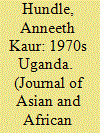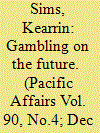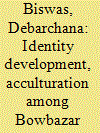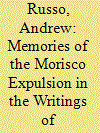|
|
|
Sort Order |
|
|
|
Items / Page
|
|
|
|
|
|
|
| Srl | Item |
| 1 |
ID:
159772


|
|
|
|
|
| Summary/Abstract |
This paper explores the ongoing presence of the 1972 expulsion of the racialized Asian population by former president Idi Amin in contemporary Uganda. The expulsion was a “critical event” and thus the paper uses an “anthropology of the event” approach to focus on the architecture of silence and historical consciousness of the event in urban Kampala. The four arenas of focus are: (1) official state narratives; (2) community mobilization and public forums on urban African-Asian relations; (3) memories, adventure tales, and narratives expressed by Ugandan Asian men; and (4) the infrastructure and material culture of 1970s Asian property expropriation.
|
|
|
|
|
|
|
|
|
|
|
|
|
|
|
|
| 2 |
ID:
156691


|
|
|
|
|
| Summary/Abstract |
Following the extraordinary wealth generation of casinos in Macau and Singapore, governments and non-state actors across Southeast Asia have developed gambling establishments as a means of fast-tracking economic growth and stimulating national development. Yet, here and elsewhere, casinos have been heavily criticized for their association with immoral behaviour, problem gambling, corruption, and organized crime. In this article, I focus on two casinos in northern Laos to address two research questions. First, I consider how casinos have come to exist within the remote border regions of one of Asia’s least developed countries. I discuss vice economies within the Golden Triangle region, multi-actor aspirations to boost transnational connectivity within continental Southeast Asia, strengthening political-economic relationships between Laos and China, and Government of Laos efforts to use foreign investment as a mechanism for increasing governance capacities in borderlands. Following this, I critically analyze the relationship between casinos and development in Laos. I focus specifically on the multifarious effects of casinos on the lives and livelihoods of local communities to argue that casino development has been informed by logics of expulsion and the establishment of new predatory formations. To make this argument, the article draws on four fieldwork visits to each of the casino sites between 2011 and 2015, desk-based research, and interviews with local residents, casino staff, and members of the Government of Laos.
|
|
|
|
|
|
|
|
|
|
|
|
|
|
|
|
| 3 |
ID:
166628


|
|
|
|
|
| Summary/Abstract |
The development of identity is a procedure of individual change that can take place along various spheres of social and cultural domains. The concept of identity is always remaining fundamental in the process of acculturation and adaptation. The prominence or value has been particularly given on Chinese community of Bowbazar which is an enclave community. The study aims to elucidate that the immigrant groups adjust to the host society by persistent identity development especially by adjusting and adapting to altered or homogenize identity which is most supported along with the integration strategies. The study has been conducted on the basis of qualitative approach as well as quantitative approach. Responses from the community revealed, that the Chinese community of Bowbazar Chinatown through ages is not only able to adapt ideals, values, and behaviors of host culture but also able to retain their ideals, values and beliefs of their own cultures of origin.
|
|
|
|
|
|
|
|
|
|
|
|
|
|
|
|
| 4 |
ID:
188442


|
|
|
|
|
| Summary/Abstract |
The Morisco expulsion of 1609–1614, enacted during the reign of Philip III, left tens of thousands deserted in foreign lands and uncertain of their futures. The vast majority of those expelled ended up in Tūnis. There a small circle of educated and respected leaders among the Moriscos sought to integrate their fellows into Maghribī life through the cultivation of friendships with prestigious leaders in Tūnis and by producing writings that were meant not only to demonstrate the dignity and nobility of the Moriscos but also to show their coherence as a distinctive people with a common origin that is rooted in the history of al-Andalus. To that end, Muḥammad Ibn ʿAbd al-Rafīʿ, an émigré from Murcia, composed Al-Anwār al-Nabawiyya fī Abā Khayr al-Barriyya (“The Prophetic Lights on the Fathers in the Best Land”), a manuscript that was meant to meet concerns over the Morisco presence in the Maghrib by invoking memories of al-Andalus and Granada. The analytic tools of memory studies thus allow one to see the extent to which memories of al-Andalus were creatively conceptualized and employed to create space for the Moriscos within Andalusī history and Maghribī society.
|
|
|
|
|
|
|
|
|
|
|
|
|
|
|
|
|
|
|
|
|